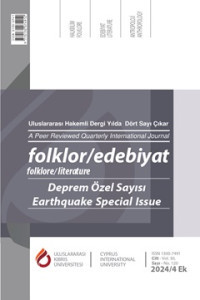Tarihçe ve Genel Bilgiler
2025 - Volume: 31 Issue: 121
Research Article
Turkish Gothic, Universal Angst: The Impossibility of Non-Existence in Dracula(s)folklore/literature Journal Article Template
folklore/literature Journal Article Template
Article Title (Bold, should be no more than 12 words, Only first letters and proper names start with a capital letter, should be written in Times New Roman, 14 pt.)
Second Language Equivalent of Article Title (Normal, Only First Letters and proper names are Captialized, should be written in Times New Roman, 12 pt.)
Author's full name
Abstract
The abstract summarizes, usually in one paragraph of 15-250 words or less, the major aspects of the entire paper in a prescribed sequence that includes: 1) the overall purpose of the study and the research problem(s) you investigated; 2) the basic design of the study; 3) major findings or trends found as a result of your analysis; and, 4) a brief summary of your interpretations and conclusions. Abstract word is written in bold, initials are capitalized and italicized to the left. Sources, figures, charts, notes, etc. should not be included in the abstract. The abstract is the short form of the article that gives a summary of each important section of the article (introduction, material-method, presentation, and discussion). The abstract should never give new information or results that are not specified in the article. Citations should not be made in the abstract. It would be helpful to begin the abstract by first mentioning what the problem at hand is. The main purpose of the article should be emphasized, what was done to achieve this goal and which methods and analyses were used should also be briefly mentioned. Findings from the study and its implications should be briefly pointed out the meanings of these should also be discussed. Finally, the abstract can be concluded with a sentence that mentions the contribution and importance of the research results to the field. The abstract should be written as a single paragraph using Times New Roman, 11 pt. The Turkish abstract for English articles should be no less than 250 words.
Keywords: Keywords should consist of three to five words, except for proper nouns, and should be written in lower case letters. Words should be separated by commas, and the order should go from specific to general.
Abbreviations
If there are abbreviations in your article, please list them under this title; otherwise, if no abbreviations are used, there is no need to use this title in your article.
Notes
If there are notes in your article, please provide information pertaining to them under this heading; otherwise, you can delete this heading.
Contribution levels of authors: First Author 100% (Example)
Ethics committee approval: Please indicate if ethics committee approval was or was not required for your study. If ethics committee approval was required, please provide the necessary information and attach the relevant documentation.
Financial support: Please indicate if your study did or did not recieve any financial support.
Conflict of interest: Please indicate if there are any potential conflict of interest(s) in the study. If there are please indicate what they are and how they were resolved.
Source contacts:
If you have any persons who have served as a source of information in your work, you must list them under this heading. You must cite the source in the given format as noted below. If you do not have any persons as sources, then you can delete this title.
Example:
Participant #1: Salim Ahmet, age 56, primary school graduate, civil servant, interview date and place: 12 March 2022 / Erzurum
References
All references, in-text and end of text, should be cited using APA 7.
Examples:
Article:
Ruxton, C. (2016). Tea: Hydration and other health benefits. Primary Health Care, 26(8), 34-42. https://doi.org/10.7748/phc.2016e1162
Book:
Malinowski, B. (1992a). Sex life of savages. (S. Özkal, Trans.). Kabalcı.
For other examples, please see our author guidelines.
Appendices
If there are attachments that are deemed necessary for you article, you must list them under this section and include the documents with your article. If not, then you can delete this section.
Derginin yayım dili Türkçe ve İngilizce’dir, ayrıca Türkçe de olsa tüm basılan makalelerin başlık, öz ve anahtar sözcükleri İngilizce olarak da makalede bulunur. Hakemlerden onay almış Türkçe makaleler için 750-1000 sözcükten oluşan genişletilmiş özet (extended summary) gereklidir. Elektronik çeviriler kabul edilmez.
Dergi TR-Dizin, Web of Science (ESCI), DOAJ ile diğer pek çok dizin tarafından taranmaktadır. Scimagoe quartile değeri: Q2 'dir:
TR DIZIN 2020 Etik Kriterleri kapsamında, dergimize 2020 yılından itibaren etik kurul izni gerektiren çalışmalar için makalenin yöntem bölümünde ilgili Etik Kurul Onayı ile ilgili bilgilere (kurul-tarih-sayı) yer verilmesi gerekecektir. Bu nedenle dergimize makale gönderecek olan yazarlarımızın ilgili kriteri göz önünde bulundurarak makalelerini düzenlemeleri önemle rica olunur.
Alan Editörleri/ Field Editörs
Halkbilimi/Folklore
Prof.Dr. Hande Birkalan-Gedik (JohannWolfgang-Goethe İniversitet-birkalan-gedik@m.uni-frankfurt.de)
Prof.Dr. Ali Yakıcı (Gazi Üniversitesi-yakici@gazi.edu.tr)
Prof.Dr. Aynur Koçak (Yıldız Teknik Üniversitesi-nurkocak@yildiz.edu.tr)
Prof.Dr. Işıl Altun (Regensburg Üniversitesi/Kocaeli Üniversitesi-İsil.Altun@zsk.uni-regensburg.de)
Doç.Dr. Ahmet Keskin (Samsun Üniversitesi-ahmet.keskin@samsun.edu.tr)
Edebiyat/Literature
Prof.Dr. Abdullah Uçman (Mimar Sinan Güzel Sanatlar Üniversitesi -emekli-29 MayısÜniversitesi-abdullahucman@29mayis.edu.tr
Prof. Dr. Ramazan Korkmaz (Ardahan Üniversitesi-emekli-Kafkasya Üniversiteler Birliği -KÜNİB-r_korkmaz@hotmail.com)
Prof.Dr. Emel Kefeli (Marmara Üniversitesi-emekli-İstanbul 29 Mayıs Üniversitesi-ayseemelkefeli @gmail.com)
Prof.Dr. Zekiye Antakyalıoğlu ( İstanbul Aydın Üniversitesi-zekabe@hotmail.com)
Antropoloji/Anthropology
Prof.Dr. Hanife Aliefendioğlu (Doğu Akdeniz Üniversitesi-hanife.aliefendioglu@emu.edu.tr)
Prof. Dr. Şebnem Pala Güzel (Başkent Üniversitesi-sebnempa@baskent.edu.tr)
Prof.Dr. Derya Atamtürk Duyar (İstanbul Üniversitesi-datamturk@istanbul.edu.tr)
Prof.Dr. Meryem Bulut (Ankara Üniversitesi-meryem.bulut@gmail.com)
Dil-Dilbilim/Language-Linguistics
Prof.Dr. Nurettin Demir (Hacettepe Üniversitesi-demir@hacettepe.edu.tr)
Prof. Dr. Aysu Erden (Maltepe Üniversitesi-aysuerden777@gmail.com)
Prof.Dr. Sema Aslan Demir (Hacettepe Üniversitesi-semaaslan@hacettepe.edu.tr)


